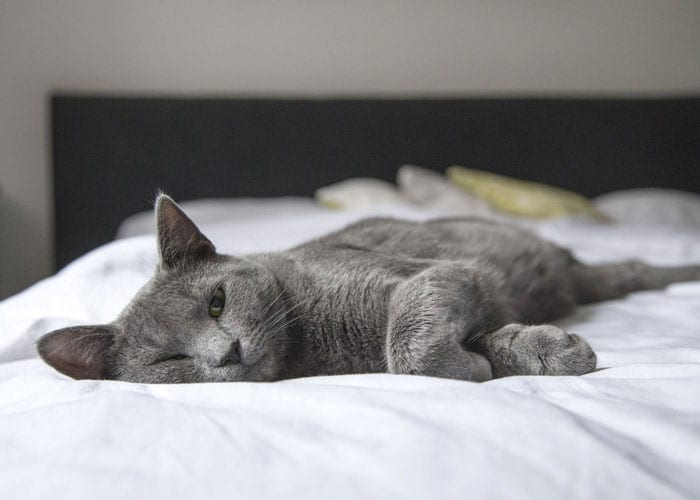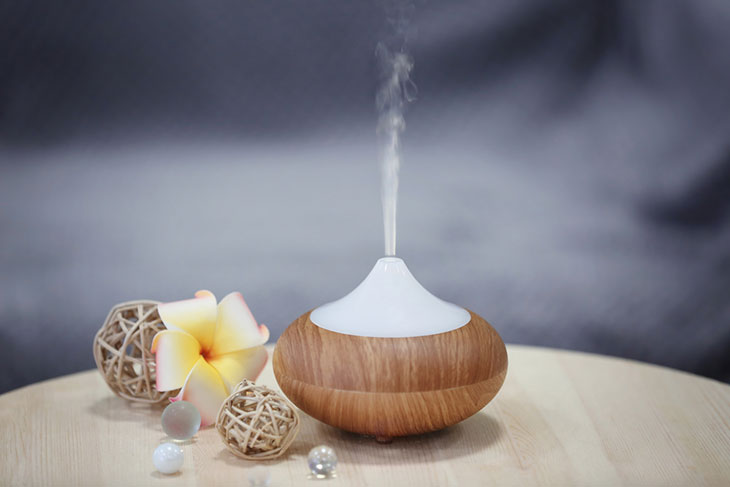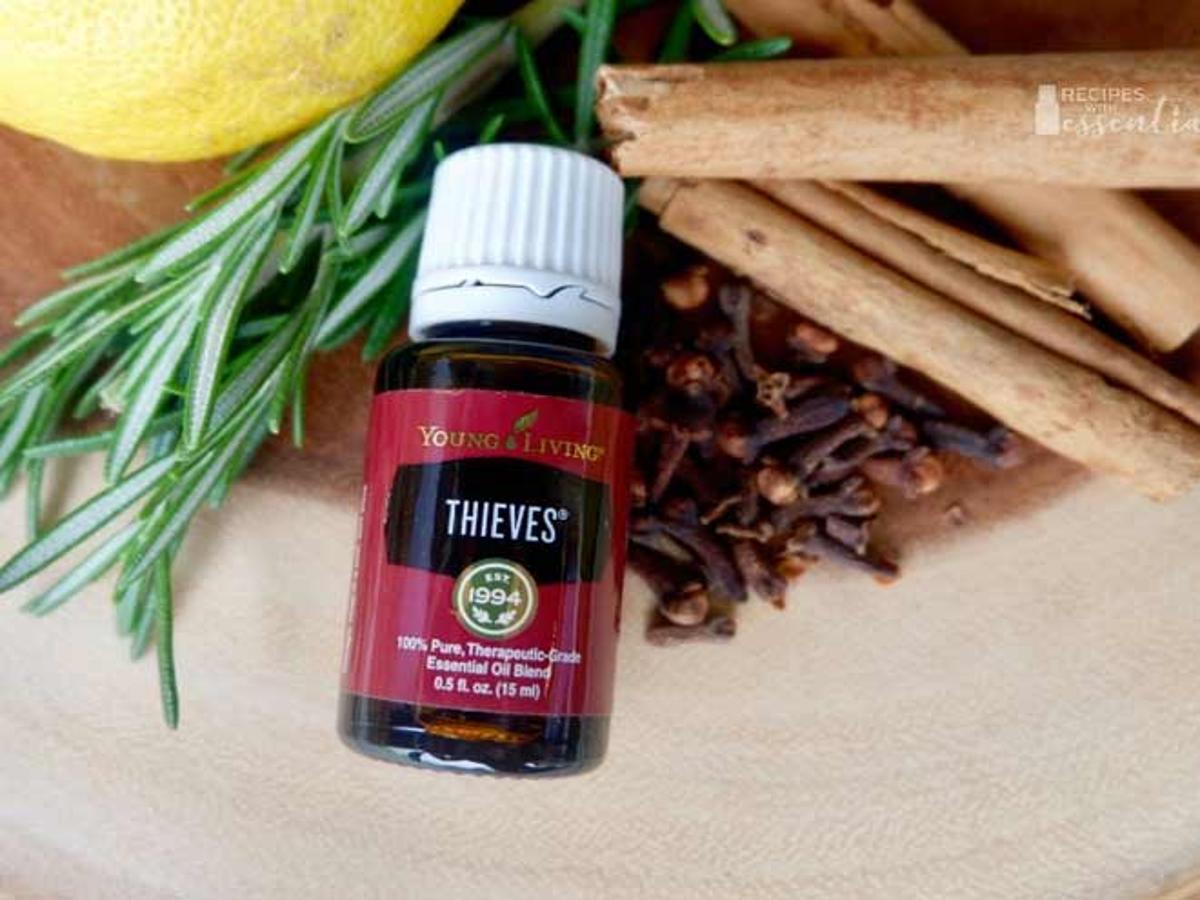Thieves oil is a rich and spicy blend of various essential oils. It has potent anti-bacterial, anti-viral, antioxidant, and anti-fungi properties. It is not surprising, then, that you may want your kitty to enjoy these perceived benefits of this amazing essential oil.
However well-intentioned your plan might be, it is judicious to understand the facts about every product you want to share with your cat.
Is thieves oil safe for cats? And if so, how should you administer it?
Here’s what you need to know before giving your cat thieves oil.
What Is Thieves Oil?
Thieves oil (or thieves essential oil) is a blend of multiple essential oils, including rosemary, clove, lemon, eucalyptus, and cinnamon bark.
It has a rich, spicy aroma and is commonly used as a home remedy for common colds and coughs. It is also used for domestic purposes like house cleaning.
Folklore has many interesting variations about the origins of this essential oil.
According to one of the stories, four thieves in the 15th century used it to rob the sick during the bubonic plague.
It is believed that the thieves applied a mixture of spices, herbs, and essential oils on their bodies and clothes to allow them to rob the sick and dying without catching illnesses.
After the thieves were punished for their crimes, doctors who treated plague victims used the essential oil recipe to reduce the chances of infection. And that’s how the essential oil recipe got the thieves oil name.
Over the years, thieves oil has been used to help fight off infection, improve moods, boost immunity, massage, and wound care. But you should note that many of its benefits are based on anecdotal claims.
However, there is a lot of research on the uses of the main ingredients of thieves oil. And researchers are investigating the effectiveness of the blend.
Is Thieves oil safe for cats?

First things first, cat owners should always be cautious when buying and using essential oils on or around their pets.
According to the American Society for the Prevention of Cruelty to Animals (ASPCA), cats are very sensitive to essential oils.
A cat’s liver lacks the P450 cytochrome metabolic pathway. This means that your cat cannot metabolize some medicines or certain metabolites of essential oils. And because they cannot break the metabolites, such essential oils can cause toxicity in cats’ bodies.
In other words, if toxins in such essential oils are absorbed, it will be difficult for a cat to eliminate the harmful substances.
Unfortunately, essential oils can be rapidly absorbed orally or through a cat’s skin, courtesy of our feline friends’ grooming habits and sensitive skins.
When significant quantities of toxins are absorbed, your pet may experience gastrointestinal upsets, lethargy, or liver damage. The extent of harmful effects depends on each cat’s sensitivity and amount of exposure.
In particular, when it comes to cats, it is critical to avoid oils that are high in phenols and salicylates. According to the Canadian Veterinary Medicine Association (CVMA), such oils include:
- Wintergreen
- Clove
- Eucalyptus
- Oregano
- Thyme
- Cinnamon bark
- Tea tree
- Mountain savory
- Lemon
- Bergamot
- European pennyroyal
- Geranium
- Lavender
- Lemongrass
- Rosemary
- Sandalwood
- Ylang-ylang
What about thieves oil? Well, as you can see, the list above contains oils that are key ingredients in thieves oil: clove, lemon, eucalyptus, rosemary, and cinnamon bark.
Since ingestion, inhalation, and skin exposure to the above oils can be toxic or deadly to cats, it is easy to see why you should avoid using thieves oil directly on your cat.
Is thieves oil safe to diffuse around cats?

Many pet parents believe that diffusing essential oils in our homes shouldn’t cause a problem to pets as the oils being used in diffusers are often highly diluted (especially when compared to those used in dietary supplementations or topical applications).
Is this true of thieves oil? Is thieves oil safe to diffuse around cats?
The short is answer is No. It is not advisable to diffuse thieves oil around your kitty—and for valid reasons:
First, diffusers put the essential oils into the air, which your cat may breathe or land on his fur. As aforementioned, ingestion, inhalation, and skin exposure of thieves oil can cause toxicity in cats.
If your kitty breathes unsafe oil (like thieves oil—as we’ve discussed above), he may suffer from respiratory irritation whose symptoms include vomiting, drooling, difficulty in breathing, and watery nose and eyes.
Pro Tip:
If you are a new cat parent, you may confuse difficulty in breathing with the kitty trying to expel a hairball.
Always remember that difficulty in breathing is characterized by cat crouching low on the ground accompanied by little abdominal movement and no hairball expulsion.
Secondly, because of the sensitive skin of your cat, micro-droplets of oil that are diffused into the air may exacerbate allergy symptoms. So, if your cat has underlying health conditions like allergies or asthma, he may be at a higher risk of poisoning.
Finally, there is risk of your cat getting access to the thieves oil however careful you try to store the diffuser. Remember that kitties are great at getting onto high surfaces.
If you have to diffuse thieves oil (or any other essential oil for that matter) around the house, there are a few precautions that you should take, including:
- Allow your cat the freedom to leave the room immediately he expresses agitation, tremors, or drooling. All these are signs that the concentration of the oil’s micro-droplets is too strong for the cat and he’s experiencing adverse reaction.
- Move your cat to fresh air immediately you suspect that he is in distress. If he doesn’t recover fast, seek emergency veterinary care.
- Watch your kitty’s reaction to essential oil being diffused. While some cats will stay or lay comfortably in a room where oil is being diffused, others will exit immediately. If your cat falls in the second category, consider diluting the oil even more next time you try diffusing the oil in his presence.
Are there essential oils that are safe for cats?

The short answer is: there isn’t any essential oil that’s 100% safe for cats—all of them have the POTENTIAL to be toxic to your kitty.
In concentrated forms, most essential oils are dangerous when applied to a pet’s skin, fur, or paws.
The only essential oils that are considered safe for cats include bergamot, chamomile, copaiba, and frankincense.
But still, they need 75%-90% dilution and are only advisable to be used on or around cats if the cats in question have tolerated them before.
In other words, if your vet gives the green light to use the mentioned essential oils, you should start with high dilution and increase the concentration oil if your fur baby tolerates it and only if necessary.
Most importantly, always consult your vet or an expert before using any oil on your cat.
Parting Thoughts
Thieves oil offer many perceived benefits but what works for us (humans) may not always be the best for our feline friends.
When using thieves oils in your home, taking a cautious approach is highly recommended.
Always consult with your vet about any hesitancy you have before using thieves oil or any other essential oil on your cat to ensure that you are acting in the best interest of your pet.

Hi! I am Eleanor Price. I started this website after my cat, Louie, almost died from a case of botulism (a type of food poisoning often caused by bacteria that grow on food items). Turned out that my cat’s diet was the problem. I have made it my duty to provide the best information and recommendations about everything cat lovers need to know about their felines’ health and wellbeing. My goal is to find the most informative content on anything feline-related and share it with fellow hardworking kitty lovers.

